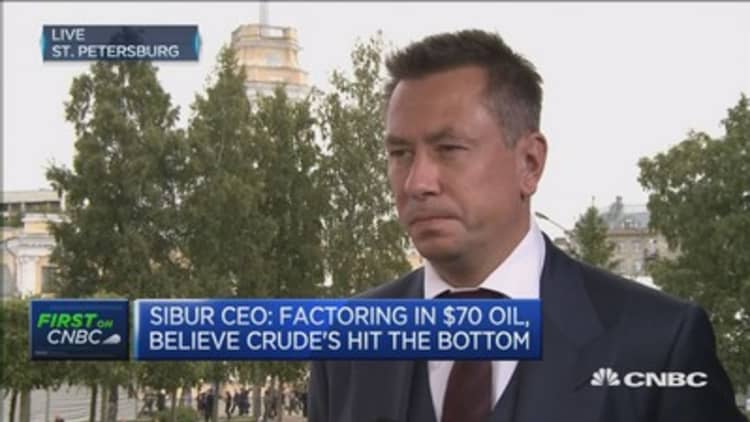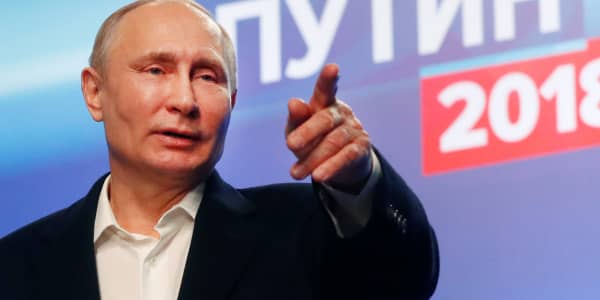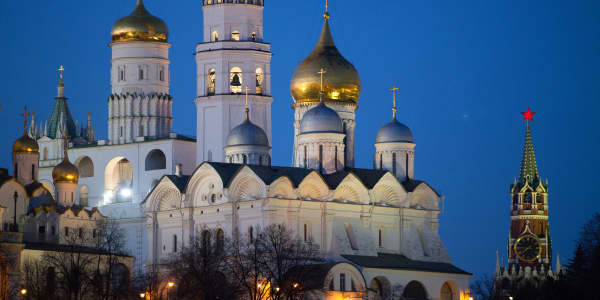



International sanctions may have contributed to a period of economic turmoil in Russia but some of the country's chief executives have told CNBC that they have thrived under the trade embargo.
Russia has been operating under international sanctions for over a year now since its annexation of Crimea last year and perceived role in the pro-Russian uprising in east Ukraine.
While the ban has hit some Russian sectors hard, such as banks and energy companies, sanctions have also galvanized other companies to become more attractive to their home market, more competitive and more efficient in terms of infrastructure.
Vladimir Tikhomirov, chief economist at Russian financial services firm BCS Financial Group, told CNBC that some businesses were thriving from Russia's political and economic isolation.
"It is quite obvious that there are some companies that have benefited -- and are likely to benefit from continued sanctions -- and these are agricultural and food producers," he said.
"Russia gross domestic product (GDP) data after the sanctions were imposed showed that some sectors of the economy were posting significant increases in output, such as the dairy sector and meat production."
Russia food producers were given a boost by Russia's retaliatory ban last August on agricultural imports from Europe, U.S., Australia, Canada and Norway, forcing consumers to shop for home-grown products.
Agricultural production figures from Russia's State statistics service certainly do show a jump in agricultural output from the second to third quarter of 2014, with an index of output in "farms of all types" leaping from 101.7 to 111.0 in that period.
Loving sanctions
Dmitry Kostygin, chairman of Russian online retailer Ulmart, told CNBC that "food retailers are doing fantastic and some retailers are doing quite well" out of sanctions.
"We see that demand has shifted. People travel less abroad, they stay at home so they go less to restaurants - they shop and cook themselves to a certain degree. Overall, it's quite an interesting experience," he said.
The experience shows no sign of ending any time soon. The country has been accused of not upholding a ceasefire agreement with Ukraine following a recent uptick in violent skirmishes in the region, raising the prospect of an extension of sanctions.
On Wednesday, European officials agreed in principle to extend sanctions by six months and this is expected to be ratified on Monday. However, their Russian counterparts said Thursday that it did not plan to extend its own retaliatory sanctions.
Surprisingly, Kostygin said he would be disappointed if sanctions were lifted.
"I would be disappointed if the sanctions were cancelled and I think for Russia this is quite a healthy process honestly," he said, speaking to CNBC from SPIEF. "I see that quite a lot of production has shifted from Ukraine into Russian companies and that's worth tens of billions of dollars and also agriculture is on the rise. So, while it's somewhat painful - like moving out of your parents' home for the first time - it's necessary and it's healthy."
Perfect storm
On a sector-specific level, sanctions have put a ban on financing some Russian banks, energy and defense companies, an embargo on exports of certain energy-related equipment and technology and a ban on the trade in arms with Russia.
As such, Russia's old guard of financial firms and oil and gas companies have suffered from the impact of sanctions, lower oil prices and rampant inflation caused by investors dumping the ruble last year, causing it to lose half its value against the dollar.
Read MoreVTB to central bank: Don't slow down
The "perfect storm" of factors hitting Russia's economy means that Russia's economy is forecast to shrink by 3.4 percent in 2015, according to the International Monetary Fund's latest statistics, albeit a smaller contraction than previously forecast.
Russia is not the only country to be hurt by sanctions, however. Germany, which export many goods to Russia, saw exports to the country fall by 18 percent in 2018. Europe, meanwhile, has tried to put a brave face on Russia's retaliatory ban.
Read MoreHas Russia justearned itself more sanctions?
The European Commission states on its website that: "in spite of the Russian ban, after seven months of embargo, total EU agri-food exports to third countries (those outside the EU) increased by 2.3 percent in value in the period August 2014-February 2015 compared to the same period of the previous year."
Enforced efficiency
While the slowdown on the back of sanctions has hit some sectors hard, business leaders tend to agree that trade bans have forced their companies to become more efficient.
The chief executive of SIBUR, Dmitry Konov, told CNBC that sanctions had helped companies to find efficiencies.
"I believe that Russia businesses overall has significant potential to keep on looking for efficiencies and, to some extent, I believe that the events over the last 12 months have helped the Russian economy to get stronger and healthier," he said Thursday.
Read MoreHow sanctions arehurting Russia's energy sector
"We have slowed down investment but maybe for some companies and sectors because the efficiency of investment progress was not up to scratch but now we're more selective and do things in a more efficient way," he said, speaking to CNBC at SPIEF.
Of course, not everyone feels love towards a trade ban. Vladimir Yakunin, chief executive of state-owned transportation company Russian Railways, told CNBC that the current sanctions were an "illegal limitation of economic and political collaboration between different countries" and that only the United Nations could impose sanctions.
Despite the rocky domestic backdrop, however, he said business was "satisfactory." "We are not doing bad, we are in line with the government program, we are doing our investment program…so I would say it's satisfactory."
- Written by CNBC's Holly Ellyatt, follow her on Twitter @HollyEllyatt.






